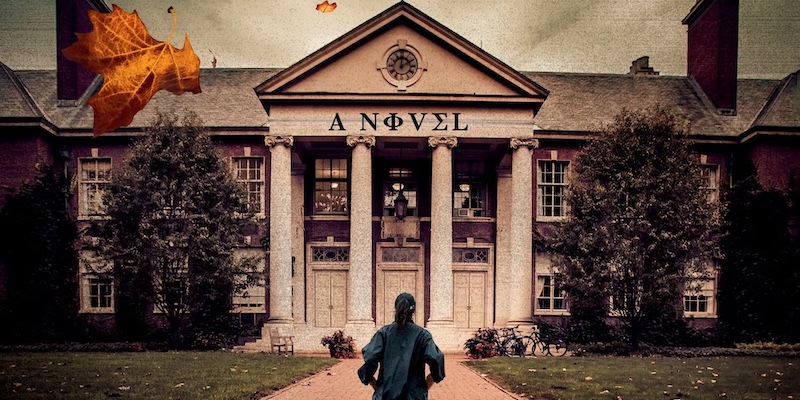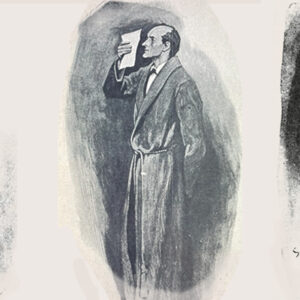Once, while browsing a university library stack, I had the sudden, dizzying feeling that the book I was staring at was moving toward me. For a moment, I doubted myself. Were my eyes playing tricks? I blinked. Nope, the entire wall of books was definitely headed in my direction.
I yelped and skittered sideways toward the rapidly narrowing opening, only to find a young woman with long dark hair and a bored expression cranking closed my stack to get to hers.
“Sorry,” she said.
I don’t think she was.
That moment of attempted asphyxiation came back to me as I contemplated the idea of why academia, and college campuses specifically, are such a ripe setting for mystery novels and thrillers.
For me, it’s the locked-room quality of a university that’s one of the biggest draws for both reader and writer. Think crowds of clever young people looking for adventure and new experiences brought together in one place. Think brilliant professors with stadium-sized egos that might lead them into dark territory.
Think research on things like viruses and weapons development, or even new philosophies, that could become dangerous in the wrong hands. Think ivy-covered walls, dark corners and secret cliques. Think lust, jealousy and competitive drive.
Who can resist a setting like that?
I know I can’t.
I’ve been a fan of campus suspense and mystery books ever since I read Donna Tartt’s hypnotic 1992 novel, The Secret History. Although some say Dorothy L. Sayer’s 1935 novel, Gaudy Night, is the OG of campus crime novels, for me Tartt’s thriller seems like the starting point for the popular sub-genre called dark academia. Tartt uses a small liberal arts college in Vermont as a vehicle for her story of six bright Classics students who find themselves in thrall of a charismatic professor and on a slippery slope toward unspeakable violence.
It chills me to this day.
As a writer, the same appeal holds. While I didn’t start out to set my mystery novel, The Botanist’s Assistant, on a college campus, I quickly realized that my vision of an awkward but unstoppable botanist on the hunt for a possible poisoner would work best with a university setting.
While The Botanist’s Assistant is more “light academia”—the Library Journal pointed to its “deadpan sense of humor” and “entertaining cast of characters”—plunking my characters on a fictitious-and-hapless university near the Central California Coast gave me a host of possible suspects and motives to play with.
It didn’t hurt that my research turned up two stories of professors who thought so highly of their intellect that they believed they could get away with murder. Turns out, their intellect wasn’t quite as superior as they imagined, and both were caught.
If you, like me, have fond or even slightly creepy memories of college, or you just like novels that make you think while also sending a chill down your spine, here are four academia-centered novels you definitely should check out.
*

Jean Hanff Korelitz, The Plot
This is the kind of mystery thriller that makes you regret again any questionable decision you ever made. Jacob Bonner is a struggling writer and MFA teacher at a low-level college who finds himself reluctantly agreeing with an unpleasant student’s claim that his idea for a novel is a guaranteed bestseller.
Years later, when Bonner learns the student died without ever writing his book, the failing author persuades himself that appropriating his student’s idea is not theft if he writes the manuscript himself. When Bonner’s book becomes a runaway hit and makes him a rich man, anonymous notes that threaten to expose him as a thief begin to appear.
I found myself flipping through the pages, my heart racing, as Bonner tries to find his accuser. This is a book that will keep you up at night, but in the best possible way.

Katy Hays, The Cloisters
While this delicious novel is set at The Cloisters, a gothic museum and garden in New York City, academic research is at its core. Art-history student Ann Stilwell is a summer hire at the museum and is thrilled to dig into the history of fortune-telling as her research project.
When Stilwell, however, discovers a fifteenth-century deck of tarot cards that may or may not tell the future, she is pulled into a world of obsession, secrets and greed. Smartly written and wonderfully plotted, The Cloisters is one of those novels you won’t soon forget.

Vera Kurian, Never Saw Me Coming
Chloe Sevre is a psychopath on a mission to murder fellow student Will Bachman. Enrolled in a secret university program designed to divert her and six other fellow psychopaths from a life of criminality, Sevre soon finds her plot to kill the boy who sexually assaulted her in high school being trumped by the systematic murder of others in her group.
This Edgar-nominated thriller is richly plotted, well-written and will have you rooting for a narcissistic, manipulative anti-hero despite yourself.

Lauren Nossett, The Resemblance
This fast-paced mystery is set at the University of Georgia and involves a fatal hit-and-run accident that may not be so accidental. Marlitt Kaplan is the police detective assigned to the case who finds the death of this fraternity member suspicious right from the start. Why did eyewitnesses say the driver appeared to be smiling and how could their descriptions of the driver also match the victim?
As the novel deepens, readers begin to realize that this case may be personal for Kaplan. This is a dark but engaging story with twists that will surprise. Kirkus Reviews promises that this is a novel that will keep readers “on their toes.”
***


















